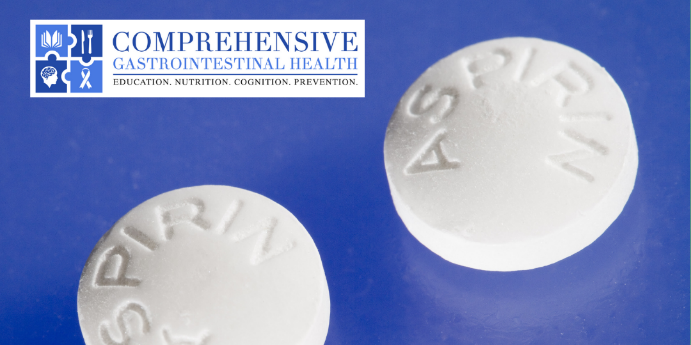ASPIRIN MAY REDUCE COLON CANCER RISK BY ALTERING GUT MICROBIOME

ASPIRIN MAY REDUCE COLON CANCER RISK BY ALTERING GUT MICROBIOME
Check out this recent study in Alimentary Pharmacology and Therapeutics showing that aspirin’s decreased risk of colorectal cancer (CRC) may potentially occur by modulating the gut microbiome.
“Aspirin, an accessible and affordable drug, is one of the most intriguing prospects for cancer prevention. In 2016, the U.S. Preventive Services Task Force recommended using low‐dose aspirin (81 mg) to reduce cardiovascular disease (CVD) and colorectal cancer (CRC) risk among adults aged 50‐59 with a 10% increased CVD risk. Currently, more than 30% of adults over the age of 40 reported taking low‐dose aspirin for primary or secondary CVD prevention; this translates into almost 39 million aspirin users in the U.S.”
“In addition to preventing CVD, aspirin use may protect against CRC development. In randomised clinical trials, aspirin use was associated with a reduction in CRC risk by 24%‐38%. However, aspirin has not been recommended for population‐based prevention in healthy people because of aspirin’s side effects (eg gastrointestinal bleeding and cerebral haemorrhage) in some individuals and lack of understanding about population subgroups in which aspirin decreases CRC risk but does not cause adverse reactions.Tailoring aspirin to individuals who will especially benefit from using this drug for CRC prevention is one of the current priorities in cancer research in the U.S.”
“Aspirin modulates inflammation and immune response via cyclooxygenase (COX)‐dependent and ‐independent mechanisms. However, the exact mechanisms through which aspirin reduces risk of colorectal neoplasia and the molecular targets of aspirin in the context of CRC prevention have not been established.”
This study demonstrated that “compared to placebo, aspirin intake influenced several microbial taxa (Ruminococcaceae, Clostridium XlVa, Parabacteroides and Dorea) in a direction consistent with a priori hypothesis based on their association with CRC. This suggests that aspirin may influence CRC development through an effect on the gut microbiome. The findings need replication in a larger trial.”
Don’t start taking aspirin quite yet though! Basically, more carefully designed larger trials need to be performed before recommending routine use of aspirin for colon polyp/cancer prevention. As well, aspirin can have dangerous adverse effects and you need to check with your doctor if aspirin is a safe choice for you! However, it is always heartening to learn of any potential new strategies to help combat the second most common cause of cancer deaths.
For today, a friendly reminder about the importance of colon cancer screening. FACT: Colorectal cancer is the MOST PREVENTABLE but LEAST PREVENTED cancer. Is it time for you to get screened?? Did you know that the American Cancer Society is recommending that ALL individuals begin screening at age 45?? We would be happy to help get you up to date with the latest colon cancer screening recommendations.
Call 224.407.4400 or email info@compgihealth.com for a procedure or consultation appointment now (evening and Saturday hours are available!).
